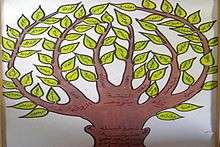Otaibah

Otaibah (Arabic: عتيبة; also spelled Otaiba, Utaybah and Otaibi for singular) is one of the largest predominantly Sunni Arab tribes in the Arabian Peninsula. Today, they are mostly found in Saudi Arabia, Kuwait, Qatar, United Arab Emirates, Jordan, Palestine and Syria.
Modern history
Otaibah are orignnlay Hejaz and Najd. They ruled Najd for years The tribe for a long time maintained a cooperative attitude towards the Ikhwan movement championed by the Al Saud clan of Nejd in the 18th and 19th centuries, and tended to side more with the Sharifs of Mecca.[1] In 1912, however, the founder of modern Saudi Arabia, Abdul Aziz Ibn Saud, began an ambitious plan to settle the nomadic tribes within his domains (which at the time included Nejd and Arabia's eastern coastal areas). This was to be coupled with indoctrination of the tribesmen into the religious ideals espoused by Muhammad ibn Abd Al-Wahhab, as the religious observance of the bedouin was hitherto considered to be somewhat loose. The new settlements were to be known as hijras and the accompanying religious movement was called Ikhwan ("the brothers"). As a result, a large number of 'Utaybi hijras sprung up across the land, especially in western Nejd. The most famous 'Utaybi hijras were 'Afif near Dwadmi, and Sajir near Shaqraa. A large contingent of 'Utaybah, led by Sultan ibn Bjad Bin Humaid aka Sultanaldeen, and also Eqab bin Mohaya Alotaibi (عقاب بن محيا) was one of the most influential leaders. Moreover, Eqab bin Mohaya belonged to [[lkhwan]] movement, and he was the head of his tribe(Talhah). Sultan bin Bajad joined the Ikhwan and became the leader of Ikhwan, who were then deployed by Ibn Saud against his rivals as he sought to unite as much of Arabia under his rule as possible. The Ikhwan were instrumental in gaining control of the Hejaz for Ibn Saud, but they then grew resentful and restless. The 'Utaybi leader of Ikhwan joined with main Ikhwan leaders from other tribes in revolt, but they were defeated by Ibn Saud's forces at the Battle of Sabilla near Al Zulfi in northeastern Nejd in 1930. The 'Utaybi hijras remained, however, and the hijra of 'Afif became particularly prosperous and is now considered a city in its own right, lying approximately halfway between Riyadh and Mecca.
Many 'Utaybis have entered the Saudi armed forces in the last few decades, and their presence with other tribes is particularly heavy in the National Guard. Prominent members of the tribe include Khalaf ibn Hathal, a poet who rose to prominence during the First Gulf War, Juhayman Al-'Utaybi, the militant who led the 1979 seizure of the Sacred Mosque in Mecca (see Grand Mosque Seizure), and Dhaifallah Al-Rogy Al-'Utaybi, mayor of Dammam and a former executive in the Saudi national oil company, Aramco, and Mutlaq Hamid Al-Otaibi a prominent Saudi Arabian poet AND MUTLAQ MUHMAS ALSHAIBANI ALOTAIBI, MAYOR Of riyadh ,
Branches of the tribe
The Otaibah tribe is subdivided into three major branches: Barga برقا, Rwog روق and Bano Saad (Sons of Saad) بنو سعد each major branch is divided into many clans, each clan is divided into various families.
- Barga The Barga clans are as follows:
- Shamlah شملة, which are divided into:
- Al Nufaei النفيعي, a clan that includes: Al Musa'aed المساعيد, Al Nakheshah النخشة, Thoi Mufarrej ذوي مفرج, Thoi Ziad ذوي زياد, Thoi Zaid ذوي زايد, Al Mahaya المحايا, Al Besaisah البسايسه, Al Feletah الفلتة, Al Salaga السلاقى and Al A'elah العيلة
- Al Rrwais الرويس, a clan that includes: Al Shuhabah الشهبة, Al Mugahesaha المقاحصة, Al Marawhah المراوحة and Thoi Mujarri ذوي مجري
- Al Mugati المقاطي, a clan that includes: Al Kerzan الكرزان and Al Bususa البصصة
- Al Tefehi الطفيحي, a clan that includes: Al Ja'adah الجعدة, Al Husanah الحصنة, Al Wethaneen الوذانيين, Al Swoatah السوطة, Alhulifat الحليفات, Al Hoboos الحبوس, Al Hulasah الحلسة, Al Humayah الحمية and Al Wegadeen الوقادين
- Eial Mansour (Sons of Mansour) عيال منصور, which are divided into:
- Al-Qthami (also spelled Al-Quthami, Al-Qathami or Al Guthami) القثامي, a clan that includes: Al Khullad الخلد, Al Ghashashmah الغشاشمة, Al Ddahasah الدهسة, Al Jabarah الجبرة and Al Zooran الزوران
- Al-Osaimi العصيمي, a clan that includes: Al Julah الجلاه, Al A'emrriah العمرية, Al Ababeed العبابيد, Al Sheja'een الشجاعين, Al Hamareen الحمارين and Al Shefa'an الشفعان
- Al Da'ajani الدعجاني, a clan that includes: Thoi Khyoot ذوي خيوط, Al Malabisah الملابسة, Al Huddaf الهدف and Al Ma'alyah المعالية and Al Swalmالسوالم
- Al Dughailabi الدغيلبي, a clan that includes: Al Na'arah النعرة, Al Gmool القمول, and Al Geba'ah القبعة
- Al Shaibani الشيباني, a clan that includes: Thoi Saleh ذوي صالح and Thoi Khalifah ذوي خليفة , Thoi garfan , Thoi Fhaid ,
- Shamlah شملة, which are divided into:
- Roug The Roug clans are as follows:
- Talhah طلحة includes: Al Asa'adah الأساعدة, Al Hufah الحفاة, Al Sumarrah السمرة, Al Hanateesh الحناتيش, Al Gharbiah الغربية, Al Karashemah الكراشمة, Al Ddalabehah الدلابحة, Al Ghawariah الغوارية, Al Theebah الذيبة, Al Hamameed الحماميد, Al Hezman الحزمان, Al Maghaibah المغايبة, Thoi Zarrag ذوي زراق, Al Ghadhabeen الغضابين, Al Barqawi and Al Awazem العوازم
- Mezhem مزحم includes: Thoi Thubait ذوي ثبيت, Al Onthyan العضيان, Al Ghubaiat الغبيات, Al Marashedah المراشدة, Al Jetha'an الجذعان, Al Seaheen السياحين, Thoi A'ali ذوي عالي and Thoi A'tyah ذوي عطية
- Bano Saad The Bano Saad is composed of many families, but can be summarized as: Al Batnain البطين, Al Lessah اللصة and Al Surairat الصريرات
See also
References
- ↑ H. Kindermann-[C.E. Bosworth]. "'Utayba." Encyclopaedia of Islam. Edited by: P. Bearman, Th. Bianquis, C.E. Bosworth, E. van Donzel and W.P. Heinrichs. Brill, 2007.